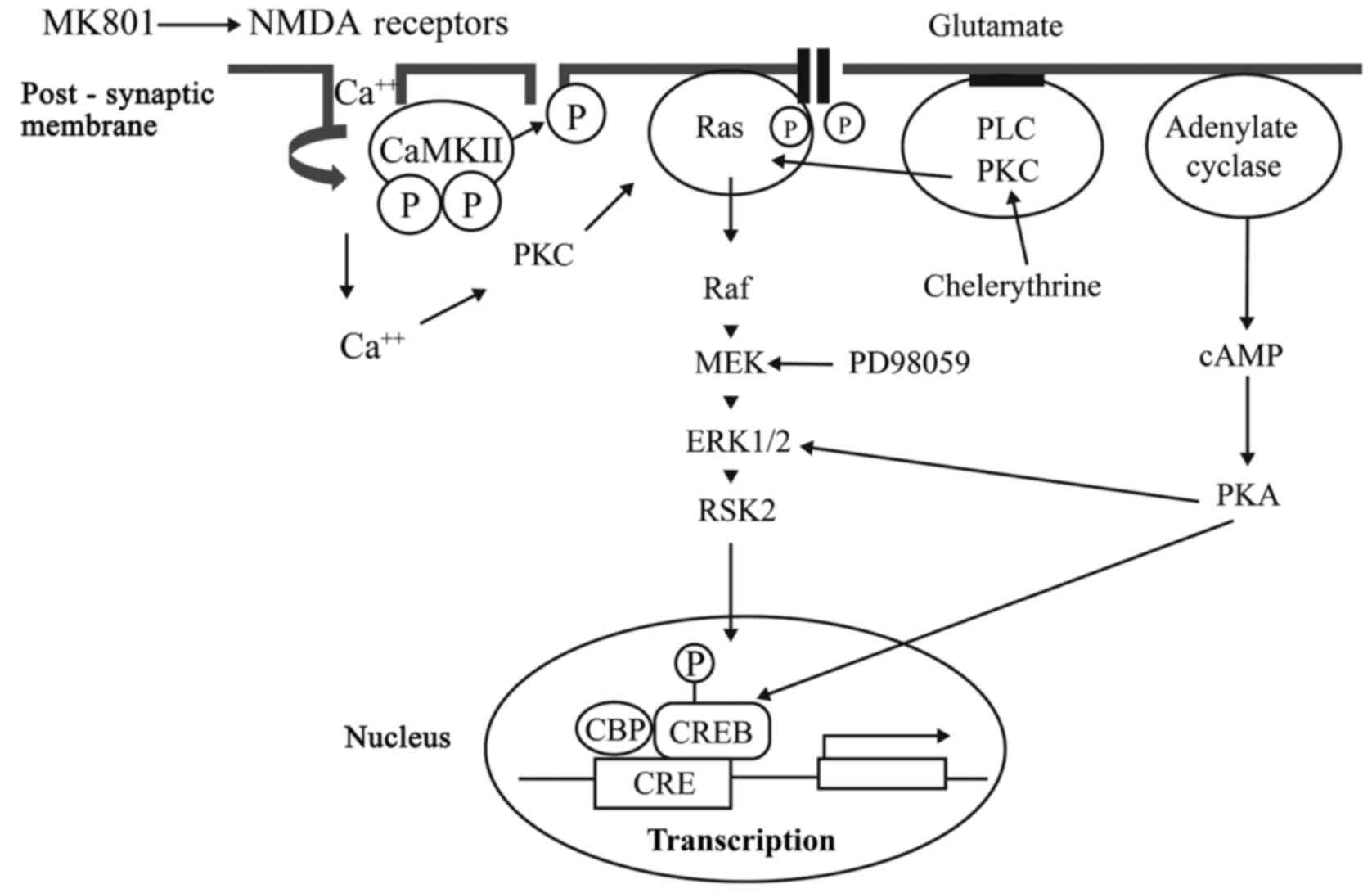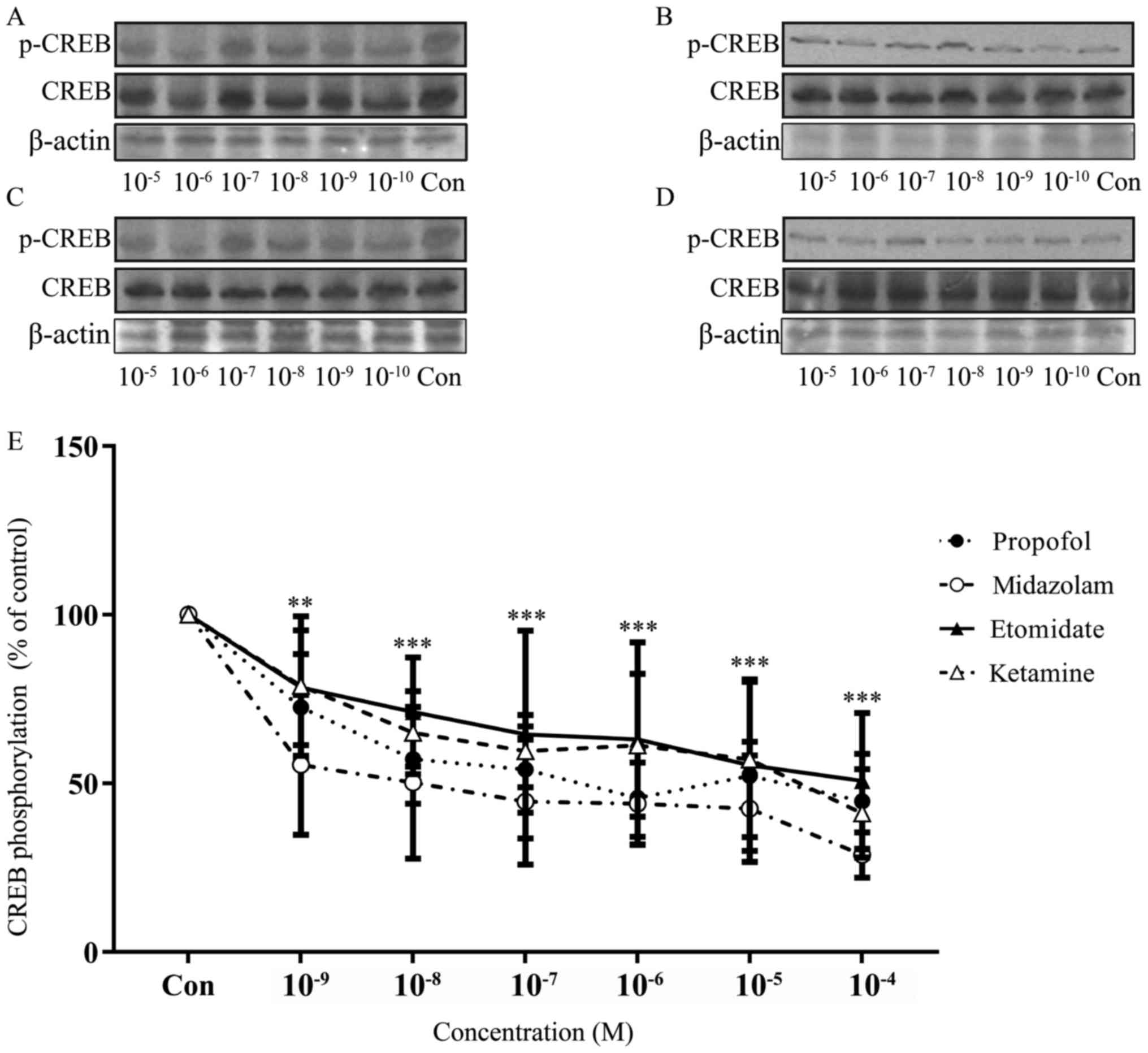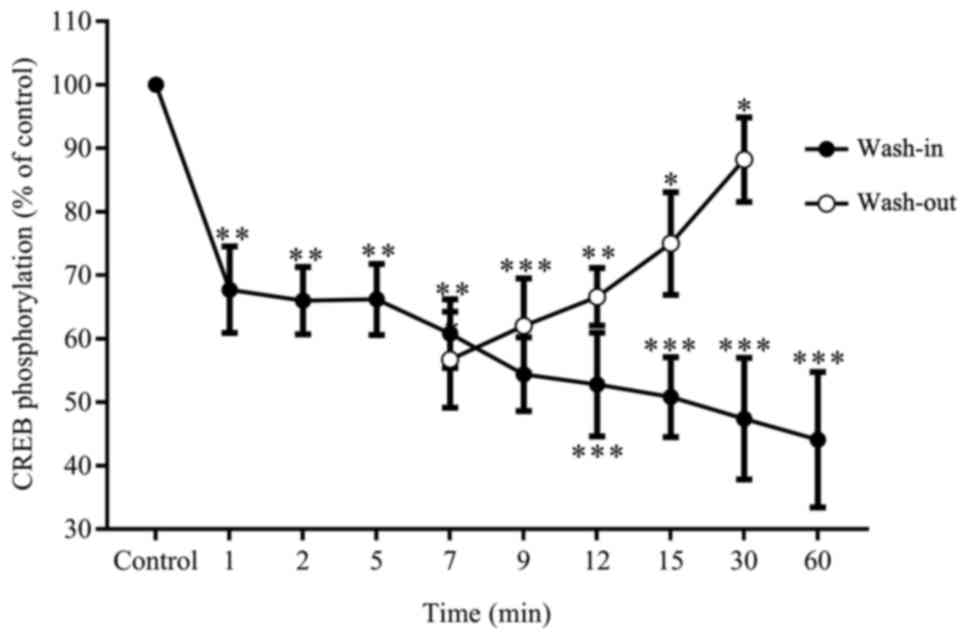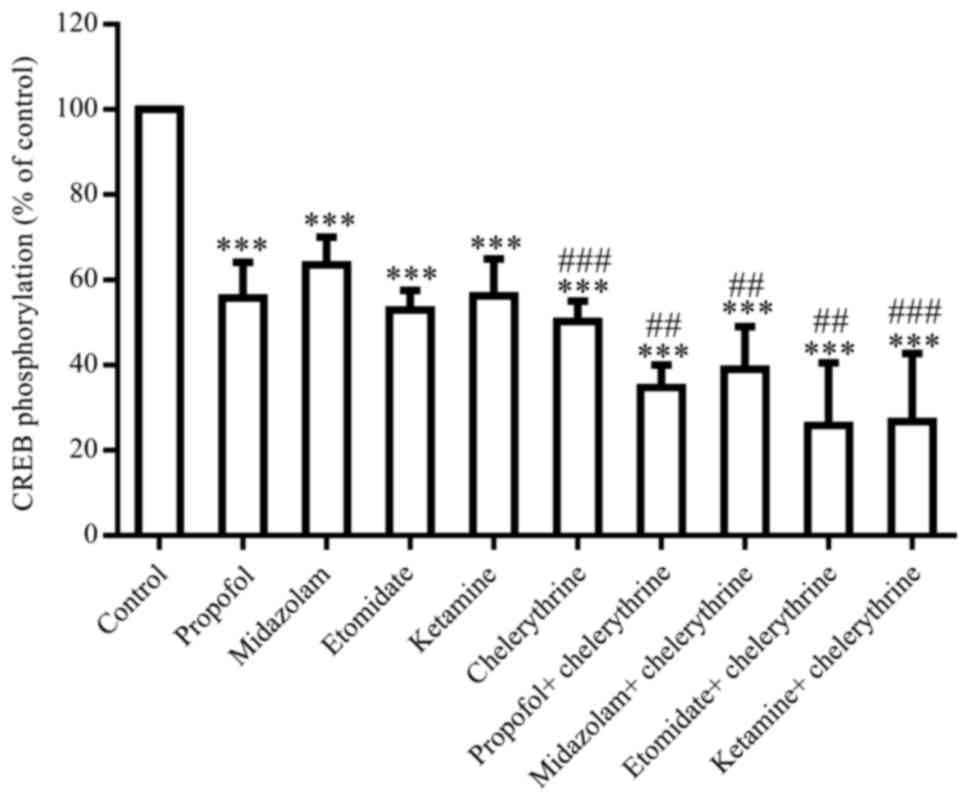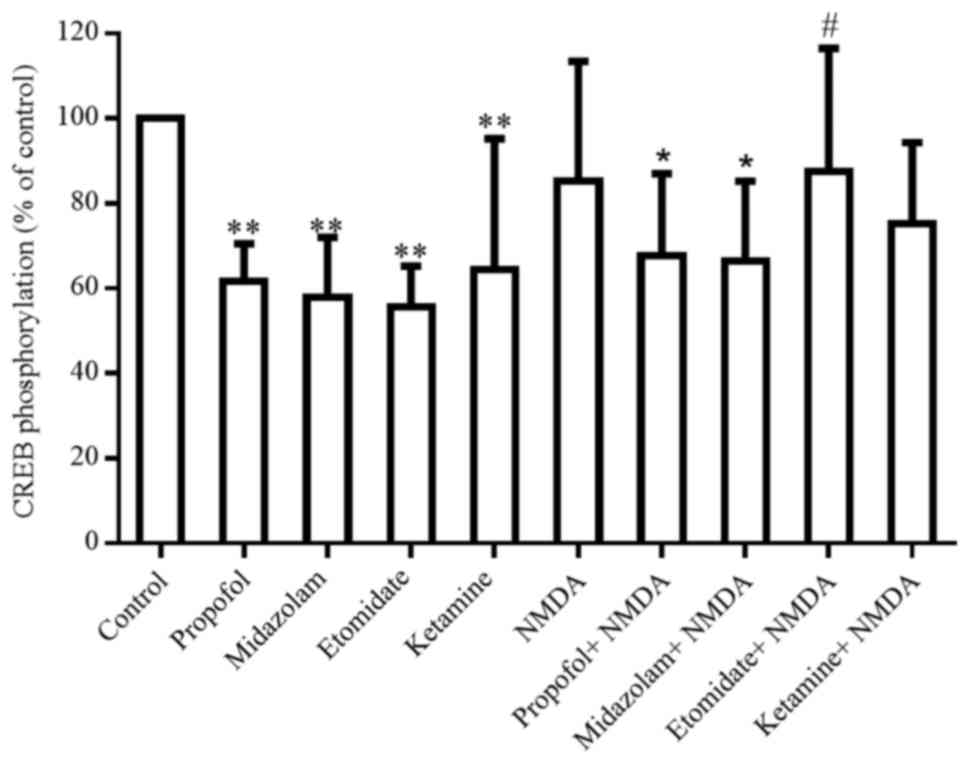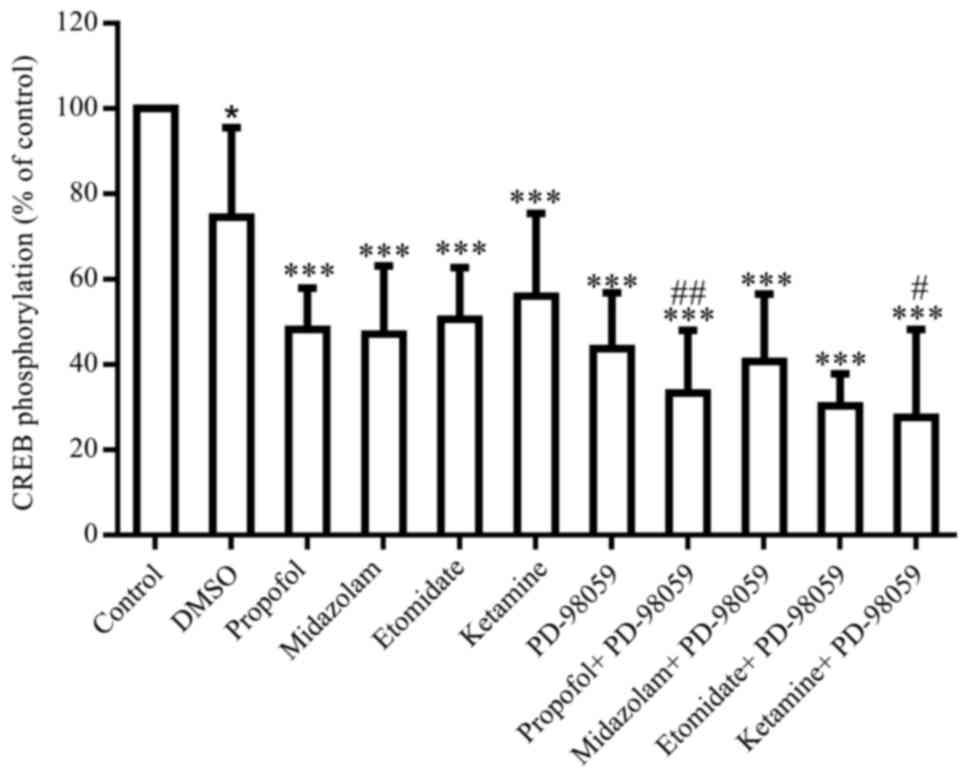|
1
|
Davis N, Lee M, Lin AY, Lynch L,
Monteleone M, Falzon L, Ispahany N and Lei S: Postoperative
cognitive function following general versus regional anesthesia: A
systematic review. J Neurosurg Anesthesiol. 26:369–376. 2014.
View Article : Google Scholar : PubMed/NCBI
|
|
2
|
Androsova G, Krause R, Winterer G and
Schneider R: Biomarkers of postoperative delirium and cognitive
dysfunction. Front Aging Neurosci. 7:1122015. View Article : Google Scholar : PubMed/NCBI
|
|
3
|
Silbert BS, Evered LA and Scott DA:
Incidence of postoperative cognitive dysfunction after general or
spinal anaesthesia for extracorporeal shock wave lithotripsy. Br J
Anaesth. 113:784–791. 2014. View Article : Google Scholar : PubMed/NCBI
|
|
4
|
Moller JT, Cluitmans P, Rasmussen LS, Houx
P, Rasmussen H, Canet J, Rabbitt P, Jolles J, Larsen K, Hanning CD,
et al: Long-term postoperative cognitive dysfunction in the elderly
ISPOCD1 study. ISPOCD investigators. International Study of
Post-Operative Cognitive Dysfunction. Lancet. 351:857–861. 1998.
View Article : Google Scholar : PubMed/NCBI
|
|
5
|
Tang N, Ou C, Liu Y, Zuo Y and Bai Y:
Effect of inhalational anaesthetic on postoperative cognitive
dysfunction following radical rectal resection in elderly patients
with mild cognitive impairment. J Int Med Res. 42:1252–1261. 2014.
View Article : Google Scholar : PubMed/NCBI
|
|
6
|
Middei S, Houeland G, Cavallucci V,
Ammassari-Teule M, D'Amelio M and Marie H: CREB is necessary for
synaptic maintenance and learning-induced changes of the AMPA
receptor GluA1 subunit. Hippocampus. 23:488–499. 2013. View Article : Google Scholar : PubMed/NCBI
|
|
7
|
Alberini CM: Genes to remember. J Exp
Biol. 202:2887–2891. 1999.PubMed/NCBI
|
|
8
|
Yin JC and Tully T: CREB and the formation
of long-term memory. Curr Opin Neurobiol. 6:264–268. 1996.
View Article : Google Scholar : PubMed/NCBI
|
|
9
|
Johnston MV, Alemi L and Harum KH:
Learning, memory, and transcription factors. Pediatr Res.
53:369–374. 2003. View Article : Google Scholar : PubMed/NCBI
|
|
10
|
Gao C, Che LW, Chen J, Xu XJ and Chi ZQ:
Ohmefentanyl stereoisomers induce changes of CREB phosphorylation
in hippocampus of mice in conditioned place preference paradigm.
Cell Res. 13:29–34. 2003. View Article : Google Scholar : PubMed/NCBI
|
|
11
|
Zhang H, Zhang SB, Zhang QQ, Liu M, He XY,
Zou Z, Sun HJ, You ZD and Shi XY: Rescue of cAMP response
element-binding protein signaling reversed spatial memory retention
impairments induced by subanesthetic dose of propofol. CNS Neurosci
Ther. 19:484–493. 2013. View Article : Google Scholar : PubMed/NCBI
|
|
12
|
Benkwitz C, Liao M, Laster MJ, Sonner JM,
Eger EI II and Pearce RA: Determination of the EC50 amnesic
concentration of etomidate and its diffusion profile in brain
tissue: Implications for in vitro studies. Anesthesiology.
106:114–123. 2007. View Article : Google Scholar : PubMed/NCBI
|
|
13
|
Praticò C, Quattrone D, Lucanto T, Amato
A, Penna O, Roscitano C and Fodale V: Drugs of anesthesia acting on
central cholinergic system may cause post-operative cognitive
dysfunction and delirium. Med Hypotheses. 65:972–982. 2005.
View Article : Google Scholar : PubMed/NCBI
|
|
14
|
Jildenstål PK, Rawal N, Hallén JL,
Berggren L and Jakobsson JG: Perioperative management in order to
minimise postoperative delirium and postoperative cognitive
dysfunction: Results from a Swedish web-based survey. Ann Med Surg
(Lond). 3:100–107. 2014. View Article : Google Scholar : PubMed/NCBI
|
|
15
|
Jia M, Liu WX, Sun HL, Chang YQ, Yang JJ,
Ji MH, Yang JJ and Feng CZ: Suberoylanilide hydroxamic acid, a
histone deacetylase inhibitor, attenuates postoperative cognitive
dysfunction in aging mice. Front Mol Neurosci. 8:522015. View Article : Google Scholar : PubMed/NCBI
|
|
16
|
Pain L, Angst MJ, LeGourrier L and
Oberling P: Effect of a nonsedative dose of propofol on memory for
aversively loaded information in rats. Anesthesiology. 97:447–453.
2002. View Article : Google Scholar : PubMed/NCBI
|
|
17
|
Mizuno M, Yamada K, Maekawa N, Saito K,
Seishima M and Nabeshima T: CREB phosphorylation as a molecular
marker of memory processing in the hippocampus for spatial
learning. Behav Brain Res. 133:135–141. 2002. View Article : Google Scholar : PubMed/NCBI
|
|
18
|
Taubenfeld SM, Wiig KA, Monti B, Dolan B,
Pollonini G and Alberini CM: Fornix-dependent induction of
hippocampal CCAAT enhancer-binding protein [beta] and [delta]
co-localizes with phosphorylated cAMP response element-binding
protein and accompanies long-term memory consolidation. J Neurosci.
21:84–91. 2001. View Article : Google Scholar : PubMed/NCBI
|
|
19
|
Josselyn SA and Nguyen PV: CREB, synapses
and memory disorders: Past progress and future challenges. Curr
Drug Targets CNS Neurol Disord. 4:481–497. 2005. View Article : Google Scholar : PubMed/NCBI
|
|
20
|
Sakurai A, Maekawa T, Sudo T, Ishii S and
Kishimoto A: Phosphorylation of cAMP response element-binding
protein, CRE-BP1, by cAMP-dependent protein kinase and protein
kinase C. Biochem Biophys Res Commun. 181:629–635. 1991. View Article : Google Scholar : PubMed/NCBI
|
|
21
|
Shiga H, Yamane Y, Kubo M, Sakurai Y, Asou
H and Ito E: Differentiation of immature oligodendrocytes is
regulated by phosphorylation of cyclic AMP-response element binding
protein by a protein kinase C signaling cascade. J Neurosci Res.
80:767–776. 2005. View Article : Google Scholar : PubMed/NCBI
|
|
22
|
Aggarwal S, Kim SW, Cheon K, Tabassam FH,
Yoon JH and Koo JS: Nonclassical action of retinoic acid on the
activation of the cAMP response element-binding protein in normal
human bronchial epithelial cells. Mol Biol Cell. 17:566–575. 2006.
View Article : Google Scholar : PubMed/NCBI
|
|
23
|
Steinberg SF: Structural basis of protein
kinase C isoform function. Physiol Rev. 88:1341–1378. 2008.
View Article : Google Scholar : PubMed/NCBI
|
|
24
|
Toullec D, Pianetti P, Coste H,
Bellevergue P, Grand-Perret T, Ajakane M, Baudet V, Boissin P,
Boursier E, Loriolle F, et al: The bisindolylmaleimide GF 109203X
is a potent and selective inhibitor of protein kinase C. J Biol
Chem. 266:15771–15781. 1991.PubMed/NCBI
|
|
25
|
Le Panse R, Coulomb B, Mitev V, Bouchard
B, Lebreton C and Dubertret L: Differential modulation of human
fibroblast and keratinocyte growth by the protein kinase C
inhibitor GF 109203X. Mol Pharmacol. 46:445–451. 1994.PubMed/NCBI
|
|
26
|
Guo Y and Feng P: OX2R activation induces
PKC-mediated ERK and CREB phosphorylation. Exp Cell Res.
318:2004–2013. 2012. View Article : Google Scholar : PubMed/NCBI
|
|
27
|
Blois JT, Mataraza JM, Mecklenbraüker I,
Tarakhovsky A and Chiles TC: B cell receptor-induced cAMP-response
element-binding protein activation in B lymphocytes requires novel
protein kinase Cdelta. J Biol Chem. 279:30123–30132. 2004.
View Article : Google Scholar : PubMed/NCBI
|
|
28
|
Gubina E, Luo X, Kwon E, Sakamoto K, Shi
YF and Mufson RA: betac cytokine receptor-induced stimulation of
cAMP response element binding protein phosphorylation requires
protein kinase C in myeloid cells: A novel cytokine signal
transduction cascade. J Immunol. 167:4303–4310. 2001. View Article : Google Scholar : PubMed/NCBI
|
|
29
|
Chang Y, Chen TL, Wu GJ, Hsiao G, Shen MY,
Lin KH, Chou DS, Lin CH and Sheu JR: Mechanisms involved in the
antiplatelet activity of ketamine in human platelets. J Biomed Sci.
11:764–772. 2004. View Article : Google Scholar : PubMed/NCBI
|
|
30
|
Hsiao G, Shen MY, Chou DS, Chang Y, Lee
LW, Lin CH and Sheu JR: Mechanisms of antiplatelet and
antithrombotic activity of midazolam in in vitro and in vivo
studies. Eur J Pharmacol. 487:159–166. 2004. View Article : Google Scholar : PubMed/NCBI
|
|
31
|
Grunwald T, Beck H, Lehnertz K, Blümcke I,
Pezer N, Kurthen M, Fernández G, Van Roost D, Heinze HJ, Kutas M
and Elger CE: Evidence relating human verbal memory to hippocampal
N-methyl-D-aspartate receptors. Proc Natl Acad Sci USA.
96:12085–12089. 1999. View Article : Google Scholar : PubMed/NCBI
|
|
32
|
Sala C, Rudolph-Correia S and Sheng M:
Developmentally regulated NMDA receptor-dependent dephosphorylation
of cAMP response element-binding protein (CREB) in hippocampal
neurons. J Neurosci. 20:3529–3536. 2000. View Article : Google Scholar : PubMed/NCBI
|
|
33
|
Mao L and Wang JQ: Interactions between
ionotropic and metabotropic glutamate receptors regulate cAMP
response element-binding protein phosphorylation in cultured
striatal neurons. Neuroscience. 115:395–402. 2002. View Article : Google Scholar : PubMed/NCBI
|
|
34
|
Lau GC, Saha S, Faris R and Russek SJ:
Up-regulation of NMDAR1 subunit gene expression in cortical neurons
via a PKA-dependent pathway. J Neurochem. 88:564–575. 2004.
View Article : Google Scholar : PubMed/NCBI
|
|
35
|
Rajadhyaksha A, Barczak A, Macı'as W,
Leveque JC, Lewis SE and Konradi C: L-type Ca(2+) channels are
essential for glutamate-mediated CREB phosphorylation and c-fos
gene expression in striatal neurons. J Neurosci. 19:6348–6359.
1999. View Article : Google Scholar : PubMed/NCBI
|
|
36
|
Takeda H, Kitaoka Y, Hayashi Y, Kumai T,
Munemasa Y, Fujino H, Kobayashi S and Ueno S:
Calcium/calmodulin-dependent protein kinase II regulates the
phosphorylation of CREB in NMDA-induced retinal neurotoxicity.
Brain Res. 1184:306–315. 2007. View Article : Google Scholar : PubMed/NCBI
|
|
37
|
Mabuchi T, Kitagawa K, Kuwabara K,
Takasawa K, Ohtsuki T, Xia Z, Storm D, Yanagihara T, Hori M and
Matsumoto M: Phosphorylation of cAMP response element-binding
protein in hippocampal neurons as a protective response after
exposure to glutamate in vitro and ischemia in vivo. J Neurosci.
21:9204–9213. 2001. View Article : Google Scholar : PubMed/NCBI
|
|
38
|
Weigt HU, Georgieff M, Beyer C and Föhr
KJ: Activation of neuronal N-methyl-D-aspartate receptor channels
by lipid emulsions. Anesth Analg. 94:331–337. 2002. View Article : Google Scholar : PubMed/NCBI
|
|
39
|
Villarreal JS and Barea-Rodriguez EJ: ERK
phosphorylation is required for retention of trace fear memory.
Neurobiol Learn Mem. 85:44–57. 2006. View Article : Google Scholar : PubMed/NCBI
|
|
40
|
Roberson ED, English JD, Adams JP, Selcher
JC, Kondratick C and Sweatt JD: The mitogen-activated protein
kinase cascade couples PKA and PKC to cAMP response element binding
protein phosphorylation in area CA1 of hippocampus. J Neurosci.
19:4337–4348. 1999. View Article : Google Scholar : PubMed/NCBI
|
|
41
|
Alonso M, Vianna MR, Izquierdo I and
Medina JH: Signaling mechanisms mediating BDNF modulation of memory
formation in vivo in the hippocampus. Cell Mol Neurobiol.
22:663–674. 2002. View Article : Google Scholar : PubMed/NCBI
|
|
42
|
Li GD, Chiara DC, Cohen JB and Olsen RW:
Numerous classes of general anesthetics inhibit etomidate binding
to gamma-aminobutyric acid type A (GABAA) receptors. J Biol Chem.
285:8615–8620. 2010. View Article : Google Scholar : PubMed/NCBI
|
|
43
|
Straub CJ, Lau HM, Parlato R, Schuetz G,
Fritschy JM and Rudolph U: Bidirectional regulation of intravenous
general anesthetic actions by α3-containing γ-aminobutyric acid A
receptors. Anesthesiology. 118:562–576. 2013. View Article : Google Scholar : PubMed/NCBI
|
|
44
|
Dutta A, McKie S and Deakin JFW: Ketamine
and other potential glutamate antidepressants. Psychiatry Res.
225:1–13. 2015. View Article : Google Scholar : PubMed/NCBI
|















